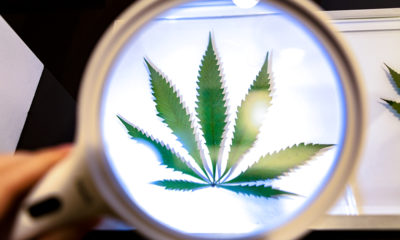Medical
Arizona Researcher Continues PTSD Marijuana Trials Despite Setbacks
Photo courtesy CopperTalkAZ
Last summer, major news networks were abuzz with a controversial firing that occurred at the University of Arizona College of Medicine. Dr. Sue Sisley, a non-tenured clinical assistant professor of psychology at the college and a medical doctor, claims that her firing had nothing to do with any lack of performance on her part. In fact, it became clear as the story developed that her dismissal was due to her high-profile advocacy for a study that would look into treating victims of post-traumatic stress disorder with medical marijuana.
The study itself would measure the effects that five different potencies of marijuana, be they either smoked or inhaled with a vaporizer, would have on treating the symptoms of PTSD in a group of fifty war veterans.
“It appears this is happening because I am at the forefront of the most controversial research happening at the university,” claimed Sisley in a telephone interview last summer. “That’s why they are throwing me under the bus.”
Even after giving the university five years of hard work and research, Sisley was still given the short end of the stick and was forced to leave the institution, effectively ending all of the research that she had been doing for her study.
The controversial part of this story enters when it was discovered that an Arizona State Senator may have been the reason that Dr. Sisley was fired in the first place. Dr. Sisley is admittedly very interested and involved in politics, which may have been a main reason for her dismissal.
She explains that she actively drafts and lobbies for legislations in her state, is open about the candidates she supports or opposes and even admits to calling local politicians in order to voice her opinions to them directly.
“That’s what I do all day — call electeds and harass them,” Dr. Sisley told the Phoenix New Times last fall after the controversy was exposed.
Her actively political lifestyle may have drawn the attention of some of those she opposed. This leads up to one Senator from her state complaining to the University of Arizona College of Medicine and her firing initiated promptly afterwards. Many believe that the move was a political one.
“The university obviously doesn’t want to touch this issue,” said Kathy Inman, director of NORML for Arizona. “They don’t want to be publicly associated with the high-profile marijuana wave moving across the country and Arizona.”
Even after this controversial fiasco, Dr. Sisley didn’t give up and applied with other Arizona colleges and universities in hopes of resuming her research. However, due to the controversy of her past at that point, she was promptly denied left and right, despite the amount of good that she could achieve if her program were to continue.
However, it seems as if things are beginning to look up for Dr. Sisley and her PTSD research.
Sisley has announced recently that she plans to continue her research independently in the Phoenix area after a private, federally-regulated Institutional Review Board recently approved her request to further her research.
“It has been five years now battling the government at all levels to try to get this study underway,” Sisley explains. “Our goal is to collect the most objective data so that eventually it can be published in peer reviewed medical journals.”
On top of this approval, Sisley has also caught a big break in her attempts to gain approval in Colorado, where the state’s Medical Marijuana Scientific Advisory Council chose her study to be one of the eight selected finalists to receive a grant for continued study for the topic. In addition, Johns Hopkins University has decided to partner with Sisley, providing their full support for the study. The Colorado grant would allow for $2 million dollars to be given to Dr. Sisley in order to continue her research.
“I believe we owe it to these veterans, we have a duty to them, to at least put marijuana through the rigors of a randomized controlled trial to understand if these claims are accurate,” Sisley explains.
Due to the amount of time, effort, money and political struggle that Dr. Sisley has expended for this study, Americans for Safe Access named her the Researcher of the Year, which she received at the National Medical Cannabis Unity Conference in Washington, D.C.
Joining her on stage to receive this prestigious award were a number of the veterans who she had been working with in order to help with the symptoms of PTSD. They joined her in her political battle because they believed that what she was attempting to do was the best for those who suffer from the disorder and that her research could effectively change the lives of a large amount of veterans for the better.
Dr. Sisley has decided to split her operations between Colorado and Arizona, thanks to the support that she has received from Johns Hopkins. She is currently looking for a location in which to conduct her study in either Scottsdale or Phoenix. The site must be approved by the DEA, but if it’s approved she will receive a Schedule I research license, which will allow her to independently continue her research and to purchase her medical marijuana from the government in order to do so.
Overall, Dr. Sisley has been through what she calls a “pretty barbaric rollercoaster.” But despite all of the rejection and injustices that she has dealt with over the last year, it seems as if the sun is finally beginning to shine on what could be some of the most important medical cannabis research performed to this date.
Do you think there should be more research on the benefits of cannabis? Tell us your thoughts below.

























